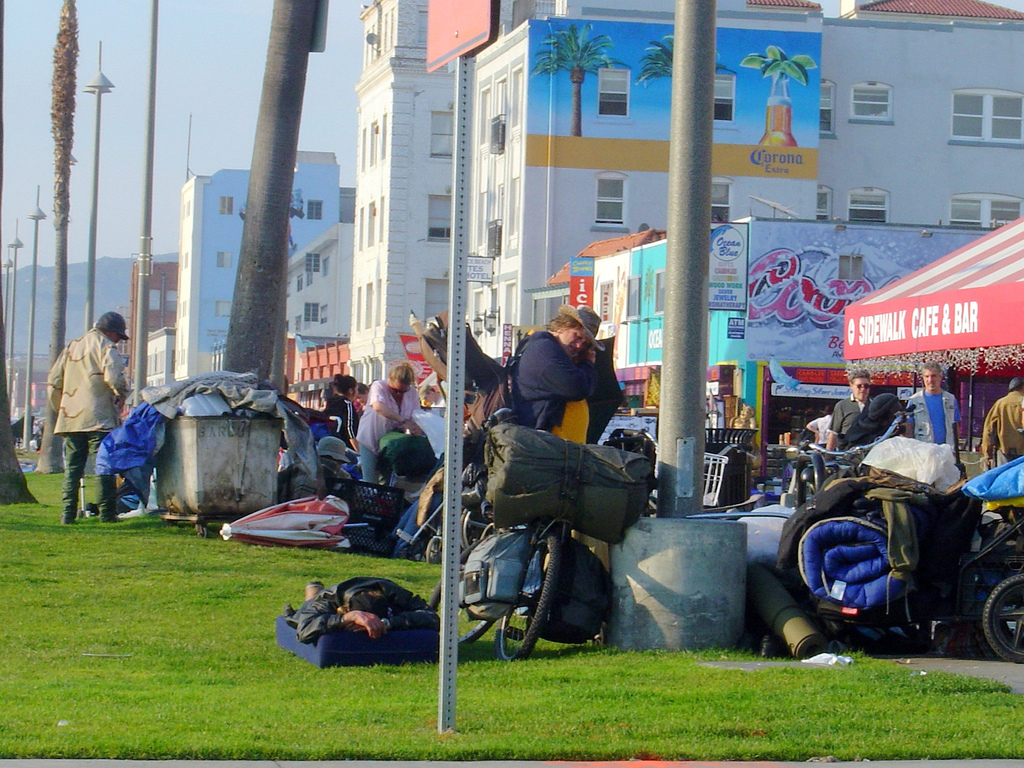
Venice and many other cities throughout California dodged a legislative bullet last month.
With the support of various homeless and civil liberties advocates, State Senator Carol Liu had proposed the so-called “Right to Rest” Bill (SB 608), which would have given homeless individuals broad rights to do whatever they wanted in public spaces: eat, rest, sleep, camp, lodge in a vehicle, worship, etc.
Some civil rights advocates see the homeless as one of the last populations in the U.S. without sufficient civil liberties.
The target of the bill is the few remaining vagrancy laws which have long protected residents from folks living “rough” on the streets, alleys and parks in dense, urban environments.
As we have seen in Venice and elsewhere in Los Angles, the courts have already shredded many of those protections. The homeless can currently lodge in vehicles on anyone’s curb in Los Angeles due to the Desertrain decision, they can sleep on any sidewalk or parkway from 9 pm to 6 am under the settlement in the Jones case and the Lavan decision allows them to leave tons of their possessions on sidewalks and parkways for days without any concern that the City will dispose of it.
The difficulty in taking the mentally ill into custody when they are harassing members of the public or screaming at the top of their lungs at 2 am in the morning – next to your bedroom window – is the result of the State’s cumbersome “section 5150” rules limiting involuntary commitment.
Due to the ill-advised Jones settlement and its limit on the Los Angeles Police Department’s ability to enforce the “No lying, sitting, sleeping” ordinance in Los Angeles between the hours of 9 pm and 6 am, Venice has seen a dramatic increase in the transient population living on our streets and alleys in close proximity to residences. This has been accompanied by a serious increase in crime, assaults and home invasions, with horrifying results.
As documented on the VSA website (venicestakeholdersassociation.org), the six block area around my residence on Rialto Avenue has experienced five home invasions since last April by transients living on public property in Venice.
In one incident on Horizon a homeless man dove through a glass door of a duplex at 4:30 am, made his way to the upstairs bathroom and tore two bolted sinks off the wall, spattering the room with blood. The tenants – a young mother and her children – escaped down a back staircase and called 911. Police later told the mother that the intruder’s Hulk-like strength suggested he was high on PCP. Before the break-in neighbors had called LAPD to complain about a man shouting hysterically on their street, but since he’d done nothing more than that, the police did not even send a patrol car to investigate.
In another widely publicized home invasion last September, a deranged homeless man broke down the door of a home on Riviera just before 9 am, and chased a half-dressed woman out her bedroom window and onto her roof. Again, LAPD missed a chance to prevent this. Just 30 minutes earlier, the intruder was in police handcuffs being questioned about yelling in public and attempting to climb the fence of an adjoining property. Yet the police, having been effectively neutered by homeless advocates and the courts, let him go because they had not caught him in the act of committing a crime.
Allowing transients greater rights to live right next to residences will only result in more harm to more residents, such as the rape and murder of the pregnant Ms. Eun Kang on Electric Avenue by the mentally ill drifter Boneetio Washington, the assault in October on Robert Di Massa by a transient living on a walk street because Di Massa’s service dog had urinated nearby, or the recent incident in which a transient living on the streets in Venice bit off the fingertip of Clabe Hartley, the owner of a restaurant on Washington Boulevard.
SB 608 would have been especially intrusive in Venice because it would allow transients to camp on any public right-of-way, which our attorney advises includes the publicly owned portion of the beach walk streets which have been informally incorporated into residents’ front yards. Imagine a person camping inside your front yard that neither you nor the police can legally expel!
In addition to the harm SB 608 would inevitably cause residents, the bill offers no improvement in conditions for the homeless: no increase in welfare benefits, no housing, no counseling, no transportation, no treatment and no more ease in committing mentally ill homeless to custody.
This is why many organizations across California, including the Park and Recreation Society, California Chamber of Commerce, State Sheriffs’ Association, League of Cities, Civil Justice Association, City of Santa Monica, LA Central City Association, and LA Fashion District Business Improvement District – and our association – strongly opposed SB 608.
The author apparently heard the many concerns raised about SB 608 and “pulled” the bill from the Senate Transportation and Housing Committee before a vote, presumably for re-drafting. It is not expected to return for another hearing until next January.
In the meantime I would suggest that the author abandon SB 608 and instead focus her efforts on overhauling the State’s dysfunctional mental health laws to make it easier for the police and mental health professionals commit mentally ill people who act out in public to psychiatric evaluation and longer periods of custody, before they can do harm or are harmed themselves.
Mark Ryavec is president of the Venice Stakeholders Association (venicestakeholdersassociation.org).

























